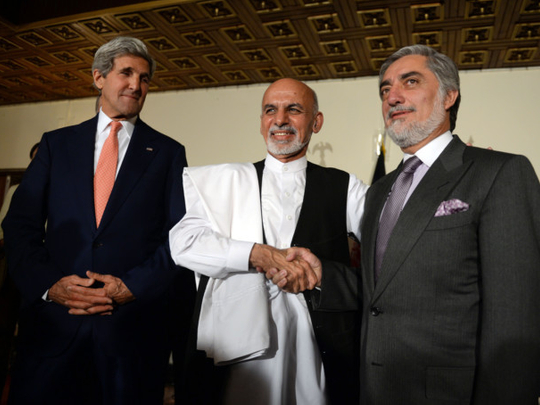
US Secretary of State John Kerry brokered an agreement on Saturday in Kabul that will see the results of the disputed June 14 second round Afghan presidential election audited over the next few weeks. The breakthrough deal alleviates the immediate crisis in the country surrounding the disputed ballot.
However, should the final result (to be announced now in August) not be accepted by all sides, the turmoil surrounding the election will be rekindled and add to the daunting array of political, economic and security risks on the horizon for the victor.
This is a potential tragedy for the country as a successful, speedy transfer of democratic power, especially if combined with an eventual reconciliation deal with the Taliban, could consolidate the power and legitimacy of the new government. And, in turn, this would help preserve some of the fragile gains secured in Afghanistan since 2001.
The preliminary results released last week from the June 14 election showed a sizeable lead, 56.4 per cent versus 43.6 per cent, for former finance minister and World Bank executive Ashraf Gani. However, his rival, former foreign minister Abdullah Abdullah, has claimed massive fraud, echoing international concerns about the legitimacy of the process to date.
In response to the brewing crisis, US President Barack Obama has threatened to end US aid to Afghanistan if either candidate resorts to “violent or extra-constitutional means” in coming days. However, despite Obama’s warning, the deal Kerry brokered over the weekend may only defer an election crisis if final results are disputed.
The official turnout in June was 8.1 million, significantly higher than many anticipated. Abdullah claims that as many as 2 million of the ballots are fraudulent.
Surprising outcome
The preliminary result was particularly surprising for Abdullah (who easily topped the first round election in April) since he subsequently secured support from the candidates who finished third and fourth respectively in that ballot: Zalmai Rassoul and Abdul Rasoul Sayyaf. These endorsements were seen as important as Abdullah’s support base is primarily concentrated in the ethnic Tajik community, while Rassoul and Sayyaf (like Gani) are from the country’s majority Pashtun community.
Unrest has already spilled onto the streets over the outcome of what is the first democratic transfer of power in the country’s history which also marks the end of the post-9/11 Karzai era. Last month, for instance, thousands of people demonstrated in Kabul.
One of the key dangers in coming weeks is increased division, potentially along ethnic and/or geographic lines, in the country. For instance, Mohammad Atta Noor, a former warlord, Abdullah ally, and current governor of Balkh Province in northern Afghanistan has said last week’s preliminary election announcement “paves the ground for the next measures, from massive protests to the formation of a parallel government”.
Such rhetoric comes at the very moment when the country badly needs to unite behind a new president. And this is especially important given the possibility of greater instability in coming months from a renewed Taliban counter-offensive.
Perhaps the number one item for the election victor will be bolstering domestic security. Unlike current President Hamid Karzai, both Abdullah and Gani have endorsed the need for a deal with US and Nato forces to keep them in the country after 2014.
While it is more likely than not that an agreement will ultimately be reached, major issues that will need to be resolved include: the fate of Taliban prisoners; extending immunity for US military personnel in the country; and any continuing US mandate to perform counter-terrorism mission in Afghanistan. These are points where the new government will walk a tightrope between keeping Washington on side, whilst not torpedoing any ongoing peace dialogue with the Taliban.
A security deal would reportedly see a remaining international force (US and Nato combined) of around 14,000 troops in 2015, which could be reduced significantly in 2016. The 2015 force will reportedly be comprised of an estimated 8,000 US personnel, and 4,000 Nato troops, supplemented by a reported 1,800 strong US counter-terrorism force. This continuing international presence will also help ensure extensive funding and training for the approximately 350,000 strong Afghan police and military forces, which may otherwise disintegrate.
While a continuing foreign force will provide a stabilising presence, Afghanistan nonetheless faces fresh assaults from the Taliban. Hence, the reason why another key priority for the new president will be advancing reconciliation with the Taliban.
Pakistan’s influence could be key in facilitating any eventual peace deal. While doubts remain about that country’s ability and willingness to facilitate such an agreement, a potentially significant move was made earlier this year when Pakistani government representatives entered into formal peace talks with the Taliban in North Waziristan.
Turning to the economic front, the new president will come into office at a very difficult moment. Since 2001, the fast-growing economy has become steadily more dependent on foreign aid. However, as international troops are withdrawn, foreign aid could be cut back markedly. In part, this is because US and Nato forces have provided a security umbrella under which some of the aid agencies have operated in recent years.
Another key problem is that there has been only very limited success in economic diversification since 2001. The danger is that, as aid is reduced, the economy becomes increasingly dependent upon drug exports such as opium and heroin.
Taken overall, should the final, audited election result be significantly disputed, it will only worsen the victor’s troubled inheritance from Karzai. This could set the stage for even greater political, security and economic instability in the country in coming months.









